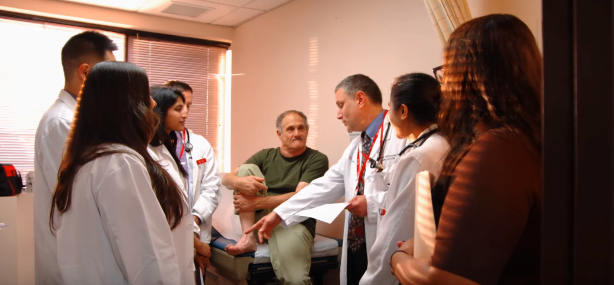BTN.com staff, April 1, 2016
During football and basketball games, BTN LiveBIG will spotlight notable examples of research, innovation and community service from around the conference. In-Game stories will provide more background on these features, and the opportunity to view the videos again.
From an early age, Jaspreet Banga?s calling was clear: provide quality healthcare for those who wouldn?t otherwise have access to it.
?When I was growing up, I saw a lot of health-care disparities, especially where my parents are from in India,? said Banga, a fourth-year medical student at Rutgers University. ?I wanted to be able to grow up and make a difference in that setting.?
She did just that by volunteering with her classmates at the Student Family Health Care Center at Rutgers New Jersey Medical School in Newark.
?We are the first student-run clinic (in the country) that provides quality health care to the medically underserved,? said Banga, who serves as a student director of the center.
First- to fourth-year Rutgers medical students serve the needs of uninsured and often impoverished patients. Divided into interdisciplinary teams, they meet with patients, take thorough medical histories and perform full physical examinations under the watchful eye of supervising physicians. The student-physician teams then formulate a comprehensive plan of care.
?At Rutgers SFHCC, we get to experience so much true patient care,? fourth-year student Romy Fontoura said. ?We also get to take a lot of our book knowledge and really use it from the first year on.?
The clinic has served the Newark community since 1968. The prior year, the city had been the site of one of the largest race riots in the nation. The medical school?s hospital, located not far from where the rioting started, treated many of the wounded.
?The idea was born amongst the medical students then to make a difference in the Newark community,? said Dr. Chantal Brazeau, the interim chair of the Department of Family Medicine at the school.
?For patients, it?s a wonderful opportunity,? Brazeau added. ?They receive care they would not otherwise receive, provided by enthusiastic students.?
[btn-post-package]Representative of the immersive-learning environment unique to Rutgers, students have the opportunity to see patients from the very beginning of their medical training, rather than waiting until their third- or fourth-year rotations.
?These students are so motivated to provide continuous primary care that they are not willing to wait,? said Dr. Michael Gerstmann, a clinical assistant professor in the Department of Family Medicine. ?They?re coming out of their student role and assuming the mantle of being a provider.?
And as Fontoura pointed out, that?s what makes working at the clinic such a valuable experience.
?I come out of there every single time feeling like I gained something,? she said. ?It?s learning for me, it?s teaching for me ? it?s just such a great part of my education that no matter how tired I am, I wouldn?t trade those clinic nights for anything.?
By John Tolley








